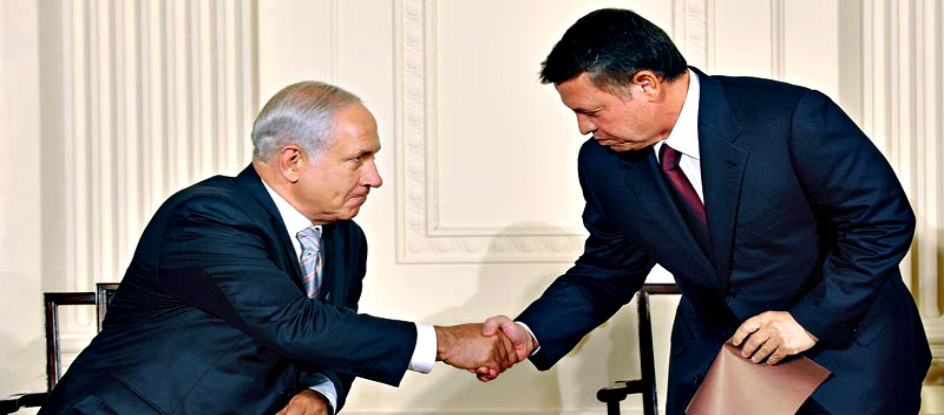In the Middle East, where respect is everything, Israel’s submissive diplomacy puts it at a disadvantage, while mediocre PR efforts seriously erode its international standing

Israel’s relationship with Jordan and Jerusalem’s recent apology for the embassy crisis in Amman, exemplifies the reborn Jewish state’s contradictory nature: a successful powerhouse with a dhimmi style diplomacy. Reborn Israel might have left exile 70 years ago but the exile mentality has still not left Israeli diplomacy.
On May 10 1948, four days before Israel’s rebirth, Israel’s future Prime Minister Golda Meir secretly met king Abdullah of Transjordan in Amman. The purpose of Mrs. Meir’s travel was to plead with the king to refrain from joining the impending Arab attack on the embryonic Jewish state. This kind of diplomacy made sense when Israel was weak and fragile. It makes no sense today when the Jewish state is a technological and economic powerhouse with one of the strongest defense forces in the world.
At the center of the recent crisis between Jordan and Israel, is an Israeli embassy security guard who killed a Jordanian citizen in self-defense after being attacked with a screwdriver. After the attack, the Israeli embassy in Amman was under siege and threatened by Jordanian authorities. Jordan should have apologized to Israel. By apologizing to a weak and hostile Jordan, Israeli diplomacy signaled to the Muslim world that the powerful Jewish state can be diplomatically abused with impunity.
Jordan is not doing Israel any favors by having official ties with Jerusalem. Israel provides Jordan with water and numerous technologies. Israel safeguarded Jordan’ sovereignty long before the countries established official ties in 1994. When Syria invaded Jordan in 1970 during the Black September war with PLO, the Israeli air force forced the Syrians to retreat from Jordan.
Unlike his father who finally made peace with Israel, the current king of Jordan, Abdullah II has been at the forefront of the international diplomatic aggression against Israel. Jerusalem should have put Jordan in place long time ago. However, in a Middle East where respect is everything, Israel’s submissive diplomacy is only pushing genuine peace even further away.
The strained relations between Turkey and Israel are mainly a result of the Turkish President Tayyip Erdogan’s aggressive neo-Ottoman and anti-Semitic policies. However, Israel’s meek diplomacy has only made the situation worse.
Israeli officials admit that it was a mistake to apologize to Turkey for the Mavi Marmara flotilla crises in 2010. Nine Turkish extremists were killed after attacking Israeli naval forces with knives and iron bars. Turkey should have apologized to Israel. Jerusalem’s apology and financial compensation to Turkey rewarded Erdogan’s extremism.
When Turkey downed a Russian fighter jet near the Syrian-Turkish border, Moscow immediately put the Turkish leader Erdogan in place who was forced to apologize to Russia. While Israel is a small country, it is nevertheless a powerful nation with the strongest military in the Middle East. Israel should have put Erdogan in place long time ago. Extremists like Erdogan only understand the language of the fist as illustrated by the Russian-Turkish crises.
In his book “Recollections”, modern Israel’s first Prime Minister David Ben-Gurion wrote:
“The Jews are sometimes like the stars, and sometimes they are as dust. I suppose that is true of mankind in general and of all individuals. Nevertheless, it is what the Talmud specifically says of us. And as a people we do run to extremes.”
The main goal of the Jewish national liberation Zionist movement was the return of the Jewish people to its ancestral homeland Israel. However, another important goal was the transformation of the Jewish people from an insecure diaspora nation to a confident and independent nation.
With a reference to the anti-Israel UN, late Prime Minister David Ben-Gurion said: “Our future does not depend on what the gentiles will say, but rather on what the Jews will do.” This defiant spirit transformed Israel against all odds, from a poor and fragile pioneer state into a confident technological powerhouse.
Unfortunately, much of Israeli diplomacy is still stuck in a submissive ghetto mentality. Israel’s mediocre public PR, hasbara, has been rightly criticized for years. However, the problem runs deeper. The Hebrew word Hasbara means “explaining” and it automatically puts Israel in a defensive position where much of the efforts are reactive rather than proactive. Israeli diplomacy has been slow in responding to the constant barrage of demonization and slander of the Jewish state.
Instead of proactively changing the international conversation and the misconceptions regarding the Arab-Israeli conflict, Israeli officials have tried to gain international sympathies by stressing Israel’s thriving culture, tolerance for gays and minorities, cutting-edge technology and many international relief efforts. While all this is true, failure to properly debunk the myth of Israel as the “villain” in the Middle East, has seriously eroded Israel’s position in the public debate in global media and on Western university campuses.
Israel is strong and does not need to beg for sympathy. Instead, Israel needs to gain respect by starting to respect itself in the diplomatic world.
Thankfully, things are slowly starting to change. Under the current Prime Minister Benjamin Netanyahu, Israel has increasingly become much more assertive in the international arena. During the past year, Netanyahu travelled extensively across the globe and proactively promoted Israel worldwide from Argentina to Australia. India’s recent warm reception of Prime Minister Netanyahu is not merely a function of the growing Indian-Israeli friendship. It is a recognition by one of the world’s largest powers that the Jewish state is an important and valuable power that deserves respect.
____________________
Daniel Kryger is a writer and a political analyst. He lives in Israel.
[Find this article interesting? You can find more in depth articles on Israel and the Middle East @en.mida.org.il]



